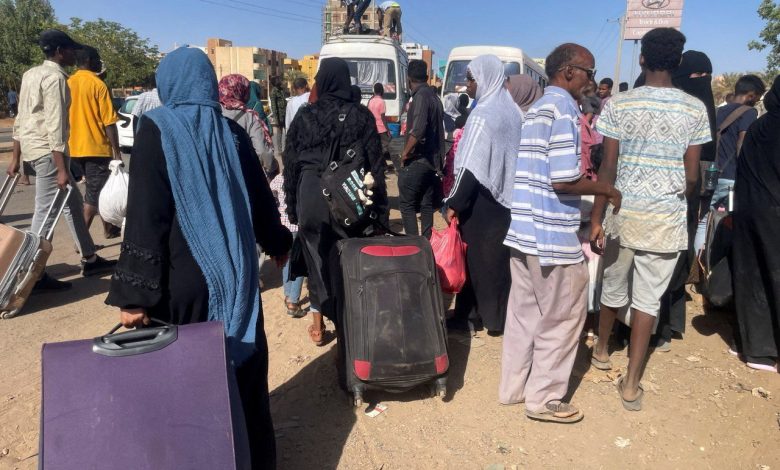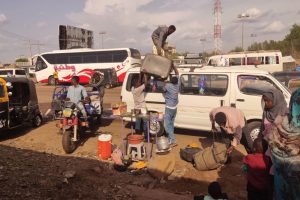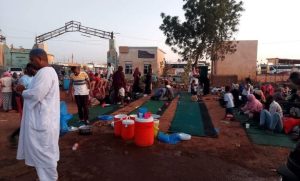Sudanese Journalists Share Their Struggles Amid War and Displacement

Khartoum – Abdulrahman Ghazali
The paths of most Sudanese journalists, who once called Khartoum their stable home, have diverged since the outbreak of the war between the government forces and the Rapid Support Forces on April 15th. They used to roam between the streets of the Republican Palace and Al-Mak Nimir in central Khartoum. However, those places have now become ruins and memories.
Journalists no longer gather around tea sellers on Newspaper Street or chat and discuss news coverage and interviews in the offices of the Kuwaiti Building overlooking the Blue Nile, which has turned into a concrete block after being abandoned.
Now, journalists have scattered across various states, searching for a new life and the safety of their lives until the war subsides and they can harness positive energies to return to their homes again.
However, others have been unable to leave their homes in Khartoum for various reasons, and they endure staying despite the risks, the sounds of artillery shelling, the buzzing of aircraft, and the constant gunfire that has become an integral part of their daily lives from sunrise to sunset.
Psychological Suffering
Journalist Ali Mirghani says that war and displacement have many facets, with the most challenging being psychological suffering. He notes that this suffering is cumulative and may not manifest itself in the early days. However, over time, it becomes evident that every family member becomes moody and sometimes irritable, leading to tension within the family. Moreover, they have become indifferent to their surroundings, caring less about the world around them, which has become insignificant to them.

Dreams of Returning Home
He adds that the most complex psychological impact falls on the youth, especially young women. Life has come to a complete halt for them. There is no education or profession; they don’t even know when life will return to normal and they can return to their homes. He wonders: Will life return to what it used to be, or has displacement become the new way of life?
He further explains, “I’m speaking from my personal experience. I moved to a village in the Nile River State. The means of livelihood there are extremely limited, to begin with.”
He points out that the village’s original inhabitants often band together against any newcomer who tries to find work in the village market or use their vehicle as a means of collective transportation.
He emphasises that the major problem they faced was housing. Initially, he found a very modest house with reasonable rent, especially in a village that had low demand. However, after a month, the number of displaced people in the village increased significantly, prompting the landlord to evict them. Despite the law being on their side, he chose to leave the house and head to a newly constructed ice factory, highlighting the significant psychological suffering of finding himself, his descendants, and his children living in an unfinished factory amidst rubble without the basic necessities of life like bathrooms, electricity, and walls with open doors and windows without any way to close them.
Foxes’ Shelter
He points out that the factory is located on the outskirts of the village. Upon arrival, they discovered a group of foxes had made it their shelter. He continues, “Of course, we forced them to choose another house, but for several weeks, they would visit us at night in search of food. However, they stopped coming, perhaps because no food scraps were left or our food usually didn’t have meat.”
He adds, “I relied on my pension and some money sent by my son from another city far from us.”
Growing Gap
He mentions that they suffered from a monthly deficit that kept accumulating, leading to a growing gap. They received some relief items from the Saudi grant, which eased some of their daily expenses. They also received American aid, including maise, vegetable oil, and chickpeas, which helped them somewhat, although it did not include essential food items.

Displacement Ramifications
He firmly believes that the government has failed to address the ramifications of forced displacement and could have alleviated the sufferings of those affected. He mentions that the central and state government’s treatment of the displaced people showed they had the mentality of government employees. They didn’t grasp the extent of the suffering and challenges faced by the displaced people.
He recalls spending the first night in the ice factory without electricity but was surprised at 10 PM by a giant scorpion passing under their feet, measuring more than ten centimetres. After that, he decided to connect electricity by any means necessary, even if it was done haphazardly.
60 Days
As for journalist Saif Jama, the editor-in-chief of the Al-Hamish News website, he says they left the capital, Khartoum, out of necessity and returned to their ancestral homeland in the Al-Jazeera Aba area after spending 60 days enduring the war and suffering.
He adds that they decided to leave with their small family after the battles intensified and the clashes between the government army and the Rapid Support Forces escalated throughout Khartoum.
Saif mentions that they managed to leave Khartoum after a long journey. They took various routes by bus before heading south from Omdurman. They then travelled west across the Nile because the bridges to the capital city were closed. Saif says they arrived in the city of Al-Duwaym in the White Nile State after a challenging 12-hour journey. Authorities stopped them from crossing the bridge to Rabak city and were only allowed to do so the following morning.
They spent that night in one of the city’s mosques. In the morning, they moved to their destination, the Al-Jazeera Aba area, where they settled, welcomed by family and neighbours.
Alternative Profession
Saif adds that he has become a resident there and immediately turned to farming on land owned by his extended family. Despite that, he still practices journalism as the editor-in-chief of the Al-Hamish electronic newspaper. However, the weak internet signal in the area has posed significant challenges to their work and access to the internet to publish news.
Saif points out that despite their suffering, they thank God for the safety of their family and their ability to evacuate them safely from the capital, Khartoum.
Leaving Home
On the other hand, Dar Al-Salam, a journalist at the Al-Shorouk TV channel, says they left Khartoum in extremely harsh conditions. She adds that the word ‘harsh’ might not do justice to the extent of suffering and hardship they endured.
She continues, ‘As the war intensified, the circle of conflict widened, and acts of looting and robbery of homes took place with the force of arms. Our homes were occupied.’
They were forced to leave for Egypt, which was just the beginning of their ordeal. She states that they were stuck at the Sudanese border in Halaib, accompanied by thousands of citizens who had fled the horrors of war. Some spent several weeks in a mosque near the passport office in the quest to obtain travel documents renew or extend their passports. Others were scattered in the hundreds in front of the Egyptian consulate in Halaib, where they obtained visas under very complex humanitarian conditions, with a complete absence of services.
Painful Stories
Dar Al-Salam continued, saying, ‘After the joy of obtaining a bus ticket at Halaib’s bus station, we were taken aback by the long queues and crowds at the entry points to Egypt.’ She pointed out that there are hundreds of painful stories, especially among the elderly who did not receive proper treatment and children who cried from thirst, hunger, and the scarcity of food items. Dar Al-Salam emphasised that what they witnessed since the outbreak of the war was extremely difficult and beyond description. It comprised a collection of painful stories and horrifying days, a suffering that will not be forgotten.
Settlement and Then Displacement
On the other hand, the journalist and media activist Sanusi Ahmed narrated the details of his suffering with the war since it began in mid-April last year. He explained why he didn’t leave Khartoum and continued to live there with his family amidst the sounds of shells and explosions. As a journalist, he told Sudan Event that he was profoundly affected by this war, just like millions of others. He described it as senseless and said it turned his life into a nightmare overnight.
Sanusi talked passionately about how his once-stable life had turned into one of displacement, restlessness, tension, fear, sadness, and pain, especially after his house was bombed by one of the warring parties.
The Future of Children
He added, ‘The worst part of this war is that children have lost their schools, and an entire academic year has been wasted. The future remains completely uncertain.’
Sanusi noted that the cost of living had significantly worsened the suffering of the war. Daily, there were near-constant increases in the prices of goods and shortages of some products.
He highlighted that what was even more challenging was that most hospitals had been closed for months, and there was no longer any medical centre to turn to in times of need.
Amidst the War
He mentioned that he had been stuck in Khartoum since April 15th and couldn’t leave the capital due to the high cost of living outside Khartoum and the lack of sufficient funds to cover travel expenses, which had skyrocketed.
Sanusi concluded his statement: “Our only hope is that the war stops at any moment, and we can live in safety, peace, stability, and rebuild what this war has destroyed.”



